Engine Coolant Fan Replacement LX5
Tools Required
J 41623-B Cooler Quick Connect Tool
Removal Procedure
- Disconnect the battery negative cable. Refer to Battery Negative Cable Disconnection and Connection in Engine Electrical.
- Remove the upper tie bar. Refer to Front End Upper Tie Bar Replacement in Body Front End.
- Disconnect the wiring harness electrical connectors from the cooling fan motors.
- Remove the clips attaching the wiring harness to the fan shroud.
- Remove the lower air deflector. Refer to Front Air Deflector Replacement in Body Front End.
- Remove the transaxle oil cooler line retaining bolt and clip from the fan shroud.
- Lower the vehicle.
- Slide the plastic cap off the upper quick connect joint.
- Disconnect the upper transaxle oil cooler line from the radiator using the J 41623-B
- Remove the two fan shroud mounting bolts.
- Lift the cooling fan assembly off the lower mounting features of the radiator and remove from the vehicle.
- Remove the fan retaining nut (5) from the motor (2).
- Remove the fan (4) from the motor shaft.
- Remove the motor retaining screws (3).
- Remove the motor (2) from the shroud (1).
Caution: An electric fan under the hood can start up even when the engine is not running and can injure you. Keep hands, clothing and tools away from any underhood electric fan.
Caution: To help avoid personal injury or damage to the vehicle, a bent, cracked, or damaged fan blade or housing should always be replaced.
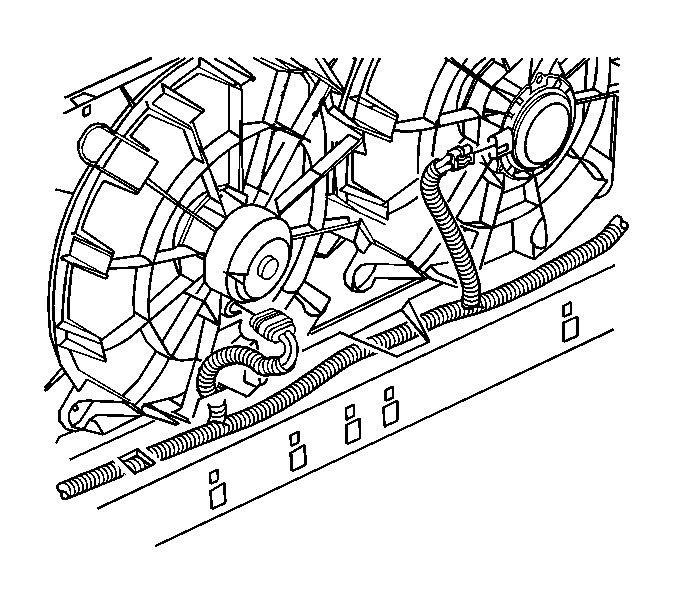
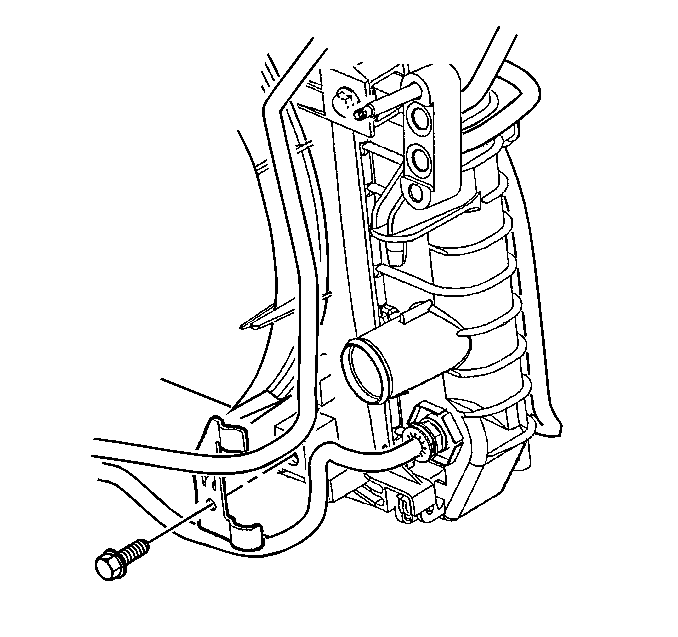
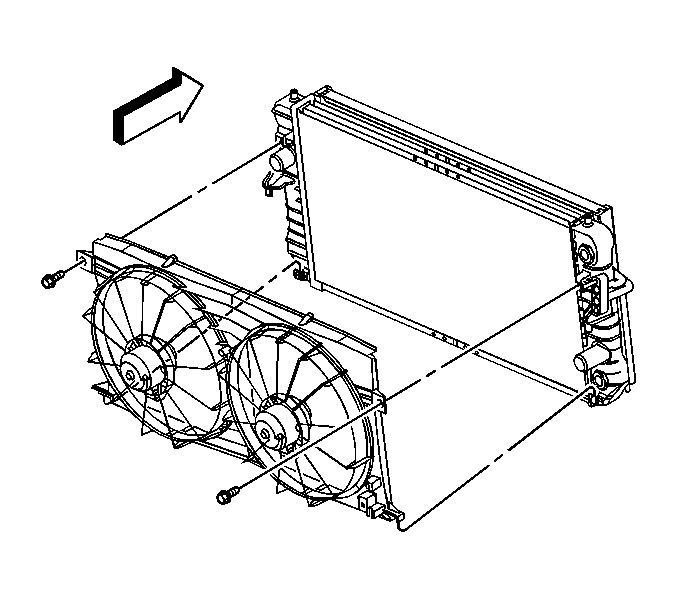
Important: Care should be taken when removing the cooling fan assembly not to damage the lower attachment points of both the cooling fan assembly and radiator.
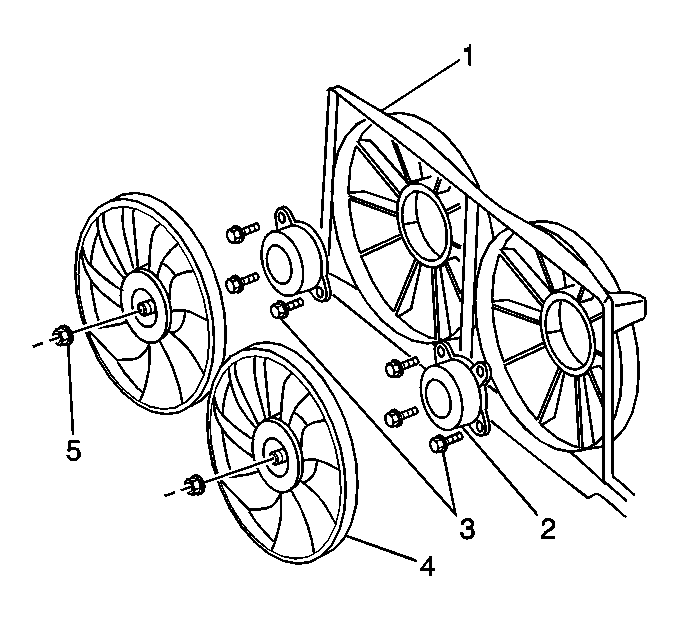
Notice: The bolt retaining the condenser to the radiator end tank is a special length and should be the ONLY bolt used upon reinstallation. The use of a longer bolt will damage the radiator end tank.
Installation Procedure
- Install the motor (2) to the shroud (1).
- Install the motor retaining screws (3).
- Install the fan (4) to the motor shaft.
- Install the fan retaining nut (5) to the motor (2).
- Install the cooling fan assembly into position, aligning the lower feet of the shroud to the lower mounting features on the radiator.
- Install the cooling fan mounting bolts
- Push the upper transaxle oil cooler line into the radiator quick connect fitting, until a "click" is heard.
- Tug gently on the cooler line to ensure proper retention.
- Slide the plastic cap (1) over the quick connect joint.
- Raise and support the vehicle.
- Install the transaxle oil cooler line retaining clip and bolt to the fan shroud.
- Install the lower air deflector. Refer to Front Air Deflector Replacement in Body Front End.
- Connect the wiring harness electrical connectors to the cooling fan motors.
- Attach the wiring harness retaining clips to the fan shroud.
- Install the upper tie bar. Refer to Front End Upper Tie Bar Replacement in Body Front End.
- Connect the battery negative cable. Refer to Battery Negative Cable Disconnection and Connection in Engine Electrical.

Notice: Use the correct fastener in the correct location. Replacement fasteners must be the correct part number for that application. Fasteners requiring replacement or fasteners requiring the use of thread locking compound or sealant are identified in the service procedure. Do not use paints, lubricants, or corrosion inhibitors on fasteners or fastener joint surfaces unless specified. These coatings affect fastener torque and joint clamping force and may damage the fastener. Use the correct tightening sequence and specifications when installing fasteners in order to avoid damage to parts and systems.
Tighten
Tighten the screws to 6 N·m (53 lb in).
Tighten
Tighten the retaining nut to 6 N·m (53 lb in).

Important: Care should be taken when installing the cooling fan assembly not to damage lower attachment points of both the cooling fan assembly and radiator.
Tighten
Tighten the bolts to 6 N·m (53 lb in).
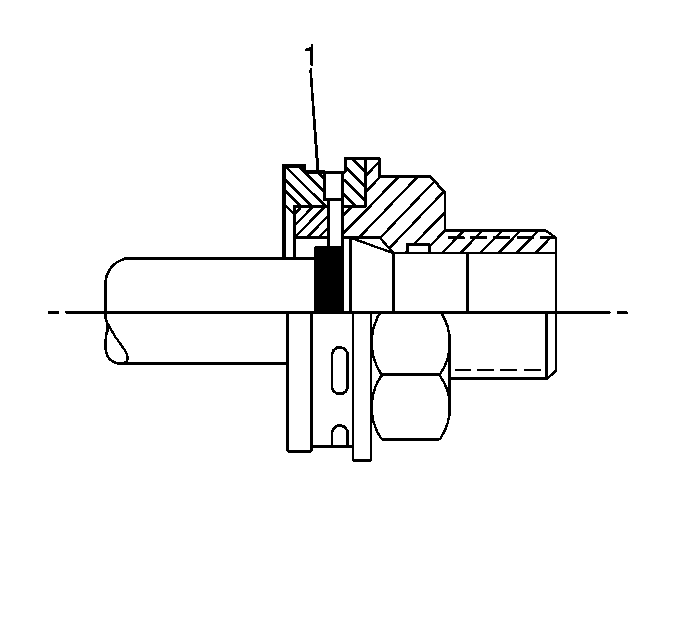

Tighten
Tighten the retaining bolt to 6 N·m (53 lb in).

Engine Coolant Fan Replacement L47
Tools Required
| • | J 37097-A Hose Clamp Remover/Installer |
| • | J 41623-B Cooler Quick Connect Tool |
Removal Procedure
- Disconnect the battery negative cable. Refer to Battery Negative Cable Disconnection and Connection in Engine Electrical.
- Remove the upper tie bar. Refer to Front End Upper Tie Bar Replacement in Body Front End.
- Drain the cooling system. Refer to Cooling System Draining and Filling .
- Using the J 37097-A (3) remove the clamp.
- Remove the radiator hose (2) from the radiator (1), and place aside over the engine.
- Remove the upper transaxle oil cooler line retaining bolt and retainer from the fan shroud.
- Slide the plastic cap off the quick connect joint.
- Disconnect the upper transaxle oil cooler line from the radiator using the J 41623-B .
- Disconnect the wiring harness electrical connectors (1) from the cooling fan motors.
- Remove the clips (2) attaching the harness to the fan shroud.
- Disconnect the 2 retainers from the A/C discharge hose.
- Remove the 2 fan shroud mounting bolts.
- Lift the cooling fan assembly off the lower mounting features of the radiator and position towards the right side of the vehicle in order to remove.
- Remove the fan retaining nut (5) from the motor (2).
- Remove the fan (4) from the motor shaft.
- Remove the motor retaining screws (3).
- Remove the motor (2) from the shroud (1).
Caution: An electric fan under the hood can start up even when the engine is not running and can injure you. Keep hands, clothing and tools away from any underhood electric fan.
Caution: To help avoid personal injury or damage to the vehicle, a bent, cracked, or damaged fan blade or housing should always be replaced.
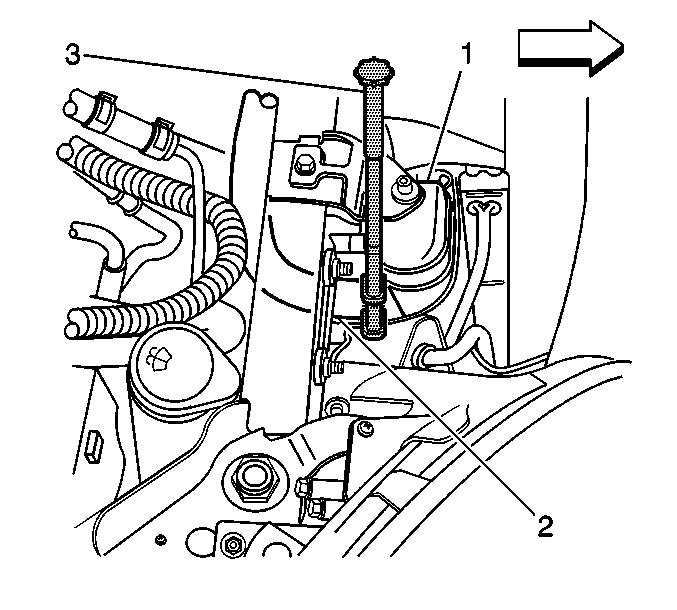
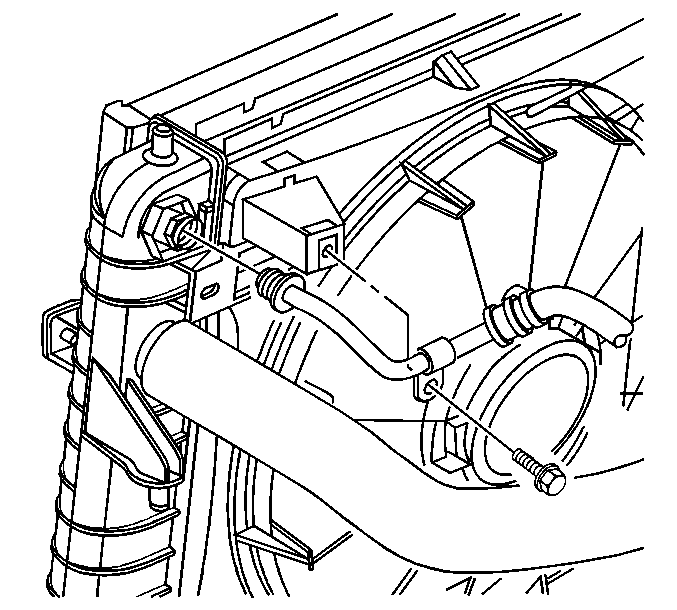
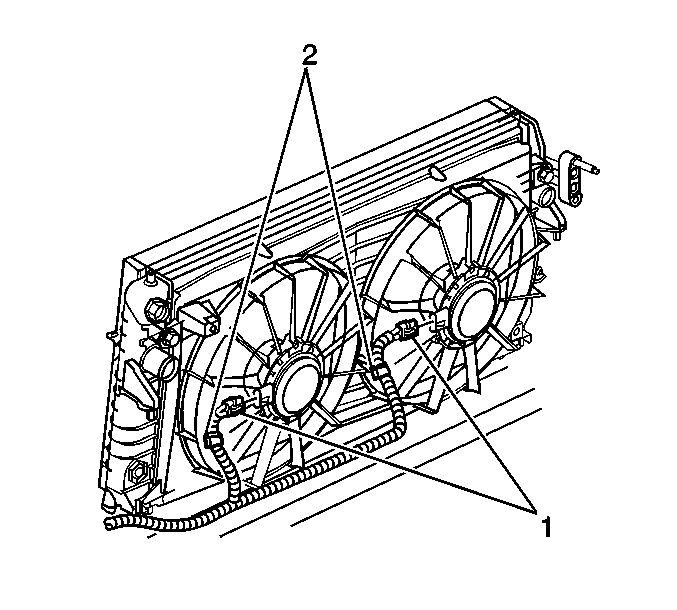
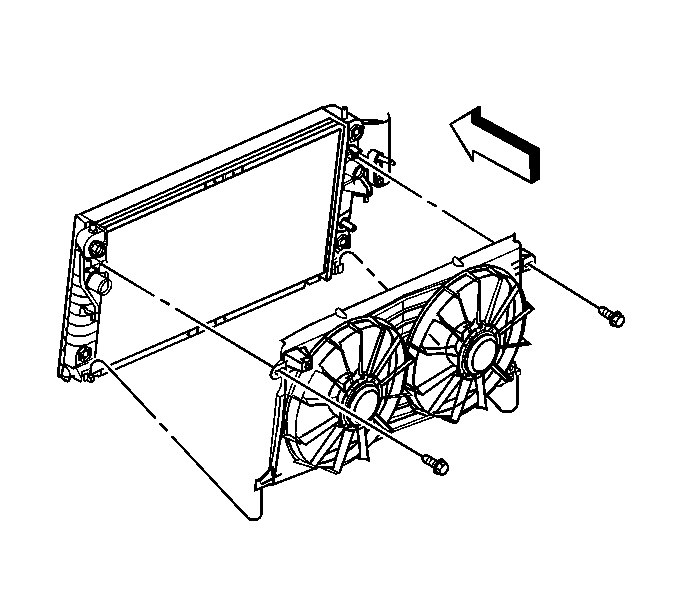
Important: Care should be taken when removing the cooling fan assembly not to damage the lower attachment points of both the cooling fan assembly and radiator.

Installation Procedure
- Install the motor (2) to the shroud (1).
- Install the motor retaining screws (3).
- Install the fan (4) to the motor shaft.
- Install the fan retaining nut (5) to the motor (2).
- Install the cooling fan assembly into position, aligning the lower feet of the shroud to the mounting features on the radiator.
- Install the cooling fan mounting bolts
- Connect the wiring harness electrical connectors (1) to the cooling fan motors.
- Attach the wiring harness retaining clips (2) to the fan shroud.
- Connect the 2 retainers to the A/C discharge hose.
- Push the upper transaxle oil cooler line into the radiator quick connect fitting, until a "click" is heard.
- Tug gently on the cooler line to ensure proper retention.
- Slide the plastic cap (1) over the quick connect joint.
- Install the upper transaxle oil cooler line retaining bolt to the fan shroud.
- Connect the radiator hose (2) to the radiator (1).
- Using the J 37097-A (3) reposition the clamp.
- Install the upper tie bar. Refer to Front End Upper Tie Bar Replacement in Body Front End.
- Connect the battery negative cable. Refer to Battery Negative Cable Disconnection and Connection in Engine Electrical.
- Fill the cooling system. Refer to Cooling System Draining and Filling .

Notice: Use the correct fastener in the correct location. Replacement fasteners must be the correct part number for that application. Fasteners requiring replacement or fasteners requiring the use of thread locking compound or sealant are identified in the service procedure. Do not use paints, lubricants, or corrosion inhibitors on fasteners or fastener joint surfaces unless specified. These coatings affect fastener torque and joint clamping force and may damage the fastener. Use the correct tightening sequence and specifications when installing fasteners in order to avoid damage to parts and systems.
Tighten
Tighten the screws to 6 N·m (53 lb in).
Tighten
Tighten the retaining nut to 6 N·m (53 lb in).

Important: Care should be taken when installing the cooling fan assembly not to damage the lower attachment points of both the cooling fan assembly and radiator.
Notice: The bolt retaining the condenser to the radiator end tank is a special length and should be the ONLY bolt used upon reinstallation. The use of a longer bolt will damage the radiator end tank.
Tighten
Tighten the bolts to 6 N·m (53 lb in).



Tighten
Tighten the bolt to 6 N·m (53 lb in).

